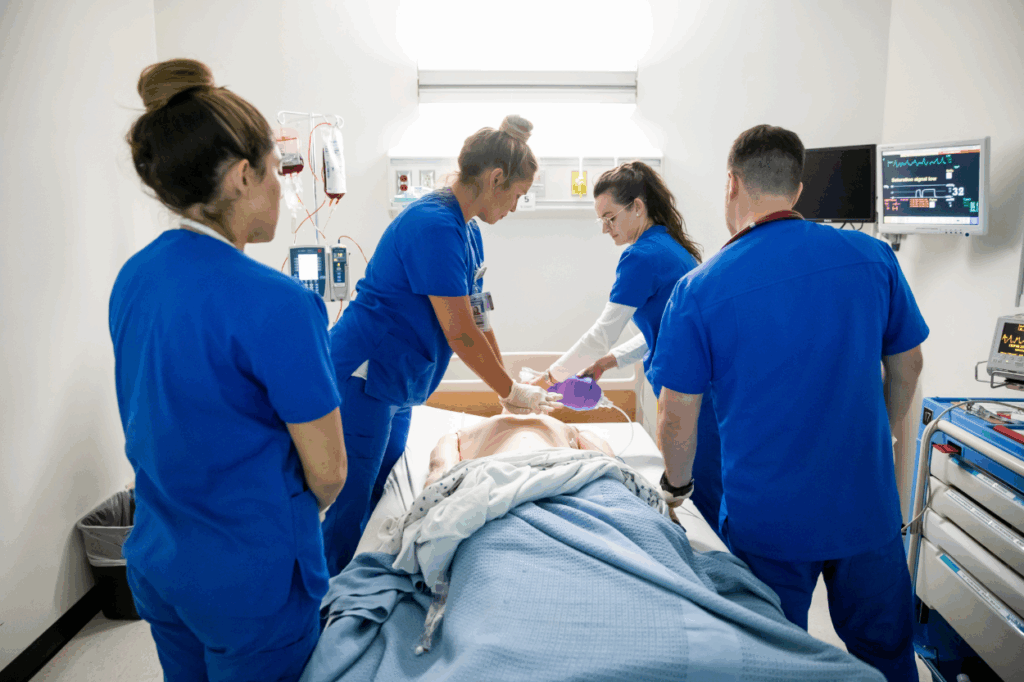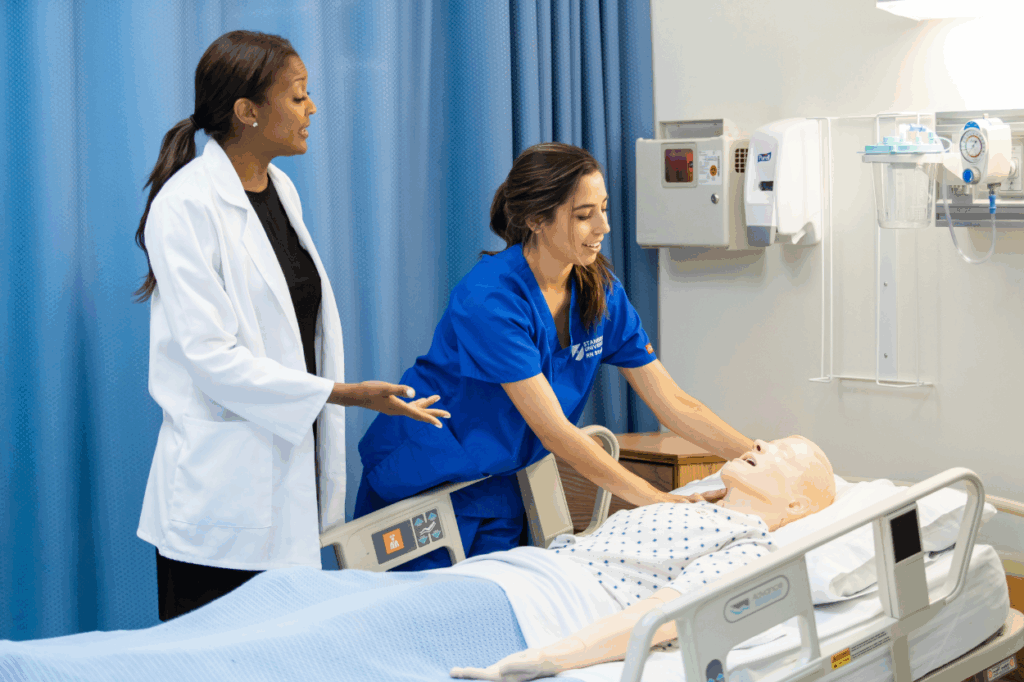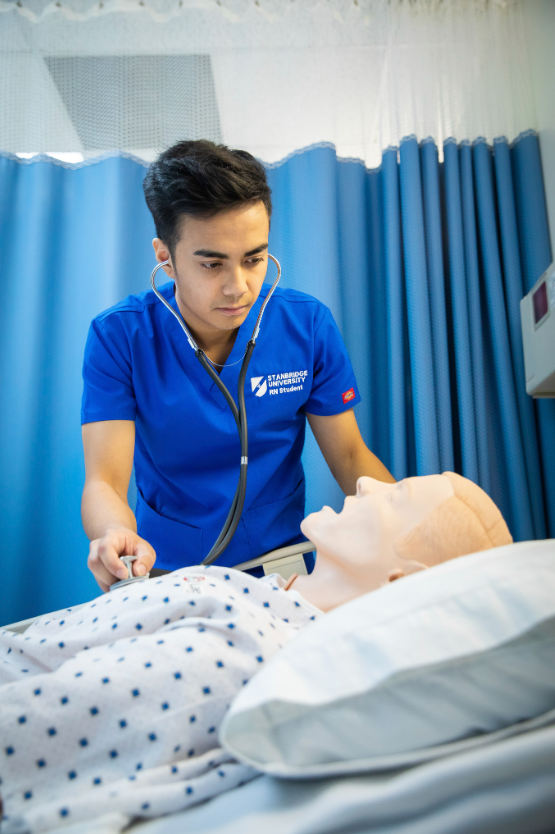What to Expect on Your Journey Through Nursing School
TL;DR
Nursing can often feel like a calling. Nurses are there in life’s most vulnerable moments, offering comfort, providing care, and helping patients take steps toward healing.¹ However, how long is nursing school? The answer depends on the path you choose. The Licensed Vocational Nurse (LVN) program takes around 17–19 months full-time or 26–28 months part-time, while a Bachelor of Science in Nursing (BSN) takes about 36–37 months at Stanbridge University.² Nursing requires commitment, but with supportive faculty, immersive labs, and hands-on clinical training, students gain training that prepares them to pursue licensure as Licensed Vocational Nurses or Registered Nurses. This blog explores what to expect in nursing school, including timelines, challenges, and how to choose the right path for you.
When considering a nursing career, it’s only natural to ask important questions from the start, such as “How long is nursing school?” “Can I sustain my interest and energy for that long?” “Is the program realistic for my lifestyle and goals?”
Nursing can often feel like a calling. Nurses are there in life’s most vulnerable moments, offering comfort, providing care, and helping patients take steps toward healing.¹ For many people, choosing nursing means embracing both a career and a deeper purpose.
Just as importantly, prospective students may wonder whether the Licensed Vocational Nurse (LVN) or the Registered Nurse (RN) path is the best fit for their personal and professional aspirations.
There’s no denying that nursing requires commitment and perseverance, but aspiring nurses are not expected to walk this road alone. The nursing education offered by Stanbridge University includes a supportive faculty and immersive, hands-on training that helps students develop the skills and confidence they may need to succeed. This article shows what to expect on the nursing education journey.
The Vocational Nursing (VN) Path: A Sooner Start
For students who want to begin working with patients sooner, the Vocational Nursing program at Stanbridge University can typically take 17–19 months full-time, or 26–28 months part-time.²
What to expect in VN training:
- Classroom study: Courses in anatomy, terminology, and pharmacology provide a strong science foundation.
- Simulation labs: Nursing Simulation Laboratories, Synthetic Cadavers, and Virtual Reality technology bring patient care to life in safe, controlled settings.
- Clinical rotations: You’ll apply skills in hospitals, long-term care facilities, or clinics, working side by side with healthcare professionals.
Graduates of the VN program can pursue licensure as Licensed Vocational Nurses (LVNs). According to the Bureau of Labor Statistics (BLS), LVNs are authorized to provide basic nursing care, monitor patients, and report on patient health under the supervision of registered nurses and doctors.³
The Bachelor of Science in Nursing (BSN) Path: A Deeper Commitment
How long does a nursing program take? If your long-term goal is to qualify as a Registered Nurse (RN), the Bachelor of Science in Nursing program is a more comprehensive journey. It takes 36–37 months to complete.²
What to expect in BSN training:
- In-depth coursework: You’ll study leadership, community health, and evidence-based practice in addition to core sciences.
- Advanced technology: High-Fidelity Simulations with SimMan, SimMom, and SimNewB prepare you for high-pressure clinical scenarios.
- Clinical experiences: Expect 8.5–12.5-hour shifts, sometimes starting at 5:30 a.m., in hospitals, clinics, or community settings.
Registered Nurses provide and coordinate patient care, educate patients and families, and support overall health outcomes. The broader scope of practice makes this pathway longer, but it also opens doors to more responsibility, leadership roles, and opportunities for further education.¹
Which Nursing Path Is Right for You?
The decision often comes down to your personal goals and current stage of life.
- The VN program may be the right fit if you want to enter the field quickly, start building experience, and support patients sooner.²
- The BSN program is often best for those who want broader opportunities, including the option to move into leadership or specialized practice down the road.¹
Both paths require commitment, but each provides training that helps you build the compassion and skills needed to make a difference every day.
Is a 2-Year Nursing Degree Hard?
Nursing school is challenging, with demanding schedules and clinicals. However, with faculty support and access to advanced resources, students receive instruction and support throughout their training.
Every health care program is demanding, and nursing is different. Vocational Nursing programs condense a great deal of knowledge and skill into a shorter timeframe. Students must balance anatomy, medical terminology, pharmacology, and clinical experiences in just over a year and a half.²
It is intensive, with early mornings, long clinical shifts, and exams. But many students appreciate the shorter timeline, and with support from instructors and peers, the challenge becomes a structured, step-by-step process toward your goal.
Can You Become an RN in 1 Year?
According to the BLS, becoming a registered nurse requires completing an accredited associate or bachelor’s degree program in nursing, followed by passing the NCLEX-RN exam.¹ Nursing degree programs generally take two to four years to complete.²
While you cannot typically become an RN in just 1 year, those who want to begin working with patients sooner may consider Stanbridge’s VN program, which prepares graduates to pursue licensure as Licensed Vocational Nurses (LVNs).² The VN pathway offers a faster entry into the field, with opportunities to build experience while considering further education.
The Takeaway: How Long Is Nursing School and What Can You Expect There?
So, how long is nursing school? For some, it may be under two years.² For others, closer to three.² Along either path, expect long hours, new challenges, and moments that test your perseverance. But also expect growth, purpose, and the knowledge that you are preparing for one of the most trusted roles in healthcare.
Are you ready to begin your journey? Visit the Stanbridge University Vocational Nursing and Bachelor of Science in Nursing program pages to explore the details of each pathway. You can also contact us directly for one-on-one guidance as you take the next step in your nursing journey.
Frequently Asked Questions
Stanbridge University VN students complete their program in 17–19 months full-time or 26–28 months part-time. BSN students complete their program in 36–37 months.²
Nursing school is challenging, with demanding schedules and clinicals. However, with faculty support and access to advanced resources, students receive instruction and support throughout their training.
Becoming a registered nurse requires completing an accredited associate or bachelor’s degree program in nursing, followed by passing the NCLEX-RN exam.¹ Nursing degree programs generally take two to four years to complete.³
Footnotes
¹Source: Bureau of Labor Statistics, U.S. Department of Labor, Occupational Outlook Handbook, Registered Nurses, https://www.bls.gov/ooh/healthcare/registered-nurses.htm. As viewed on August 29, 2025.
²Program duration subject to change. Completion times vary depending on the start and end dates of a cohort and any individual circumstances that may impact progression.
³Source: Bureau of Labor Statistics, U.S. Department of Labor, Occupational Outlook Handbook, Licensed Practical and Licensed Vocational Nurses, https://www.bls.gov/ooh/healthcare/licensed-practical-and-licensed-vocational-nurses.htm. As viewed on August 29, 2025.


